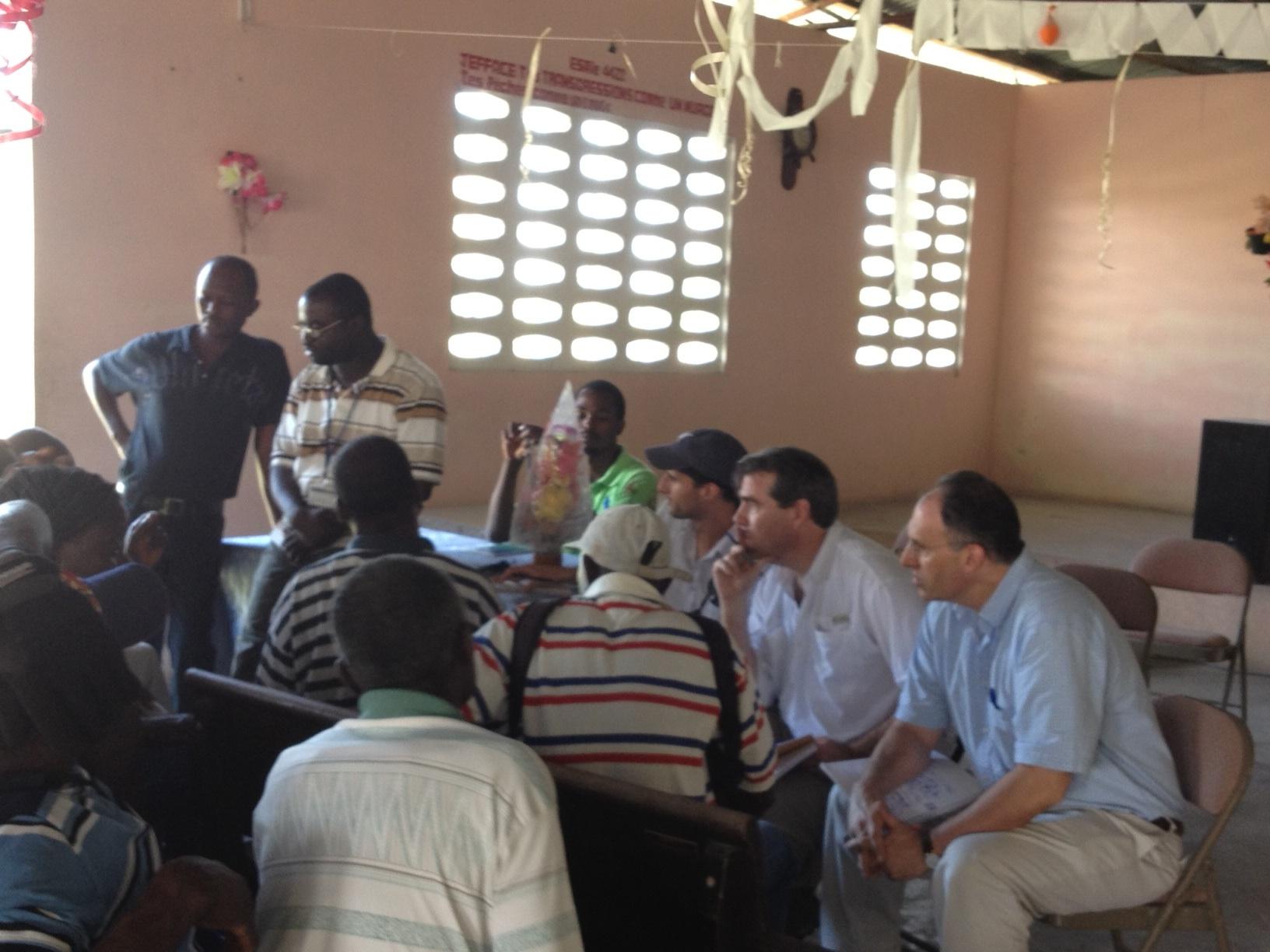‘We need to tell them the history of Haiti’
Alan Khazei, Jacob Kushner and I listen to Haitians talking about American aid in Coupon, Haiti.
PORT-AU-PRINCE – On our journey here to build a reporting team for GlobalPost, we’ve met with many young reporters and students of journalism. My friend Alan Khazei, the co-founder of City Year and a visionary social entrepreneur who has dedicated his life to motivating young people to service, accompanied me on this trip.
With one particularly talented and engaged group, Alan asked a great question: “If you could speak to America, what would you say?”
The answers to this question came in a fury of passion and all of the answers were impressive. But Yveson Dukenson, 25, who wants to be an investigative reporter, provided one of the more memorable replies:
“Americans, you want to dominate us as an imperial power. Every decision it seems you want to do that. With every gift the US gives us, we lose some power to help ourselves. I want you, America, to ask us what we think the solutions are to our own problems. That is the best way to help us solve them ourselves.”
I followed up, asking the group what they thought was the best way to tell stories to an American audience so that they could truly understand the complexities of the problems that Haiti was facing.
One student in her early 20s named Jenipher Charles made an observation that was wise far beyond her years. “To really tell the story of now we need to tell them the history of Haiti,” she said.
“Americans don’t know the history of Haiti and they don’t know who we are,” she added.
It is a simple, but powerful truth. And on this trip, I was reading up on the history of Haiti myself and quickly realizing just how little I knew about it.
The new and highly acclaimed book by Duke University history professor Laurent Dubois titled "Haiti: The Aftershocks of History" is one of those rare books on history that informs the present with the turn of every page.
It is an extraordinary account of America’s unsettling role in Haiti, which is largely kept out of most American history text books, and which only very rarely is part of the equation in news stories about Haiti.
Long before the extraordinary generosity and outpouring of American support that came after the earthquake, Dubois tells of how the US had invaded and pillaged Haiti throughout the decades.
This thoroughly documented account reveals the American hostility to Haiti’s revolution, the only successful slave revolt in the history in the world. It reminds us of the fear and vitriol that Haiti brought out in plantation owners of the South during America’s Civil War. It uncovers the unsettling truths of the brutal and often barbaric invasion by US troops in 1915 to "restore order" and the 20-year occupation that followed. It recounts how America propped up the murderous dictator "Papa Doc" Duvalier as a bulwark against the Communist revolution that had swept Cuba and brought Fidel Castro to power.
Dubois’ book is a masterpiece that informs us just how badly America bullied and bungled our way into Haiti’s history without recognizing the extraordinary story it has to tell.
As Dubois writes, “When the situation is at its worst, we should remember how this story began and what the ancestors of today’s Haitians accomplished two hundred years ago. In the midst of a brutal plantation system, they imagined a different order, one based on freedom, equality, and autonomy. But they did more than imagine it. They built it out of nothing – with fury, solidarity, and determination… Two hundred years later that remains a reminder of what is possible: If it happened once, perhaps it can happen again.”
Read this book if you want to understand this place.
You can read the first part of the Ford Foundation-funded continuing series at “Fault Line: Aid, Politics and Blame in Post-Quake Haiti.”
![]()
Our coverage reaches millions each week, but only a small fraction of listeners contribute to sustain our program. We still need 224 more people to donate $100 or $10/monthly to unlock our $67,000 match. Will you help us get there today?
